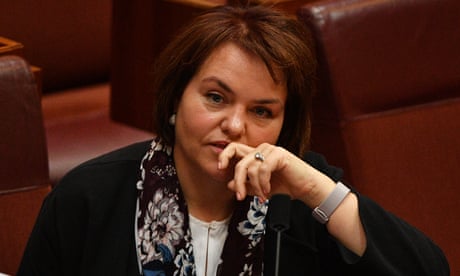- by foxnews
- 03 Apr 2025
Warrior, patriot, political player: Labor’s Kimberley Kitching remembered after sudden death
Warrior, patriot, political player: Labor’s Kimberley Kitching remembered after sudden death
- by theguardian
- 12 Mar 2022
- in news

The sudden death of the popular Labor senator Kimberley Kitching in Melbourne on Thursday cast a pall over our nation's capital and shocked politicians from across the spectrum.
Tributes surfaced on social media almost immediately after news of her passing. Liberals feted Kitching as a "patriot" and a "warrior". Labor colleagues, many still in a fog of incomprehension, struggled to process their feelings and shed tears.
Kitching will be remembered as an engaging and warm woman, with many deep friendships, a knowing smile, a quick wit, and a wicked sense of humour.
She was also a longtime player in the bitterly contested crucible of Victorian Labor politics. In the characteristic way of politics, and power, where friends can be frenemies and then friends again, some colleagues had complicated histories with her.
The Victorian rightwinger was still junior in Canberra's parliamentary pecking order, having entered the Senate in 2016, but being a keen political player, she enjoyed public prominence.
After arriving in Canberra, Kitching forged a reputation for her work in foreign affairs and defence, and on human rights. She was a committed foreign policy hawk - an enthusiastic member of the "Wolverines" - a cross-party group of parliamentarians campaigning for a tough stance against China.
Kitching controversially used parliamentary privilege in a Senate hearing only last month to name the alleged "puppeteer" behind a Chinese foreign interference plot foiled by the Australian Security and Intelligence Organisation. Mike Burgess, the head of Asio, refused to answer Kitching's question and told her it was "unfair that you ask me that question in public".
Kitching was close to the Liberal senator James Paterson, a fellow Victorian, and a fellow Wolverine, who chairs the joint parliamentary committee on intelligence and security. After news of her death became public, Paterson described Kitching as "a warrior for her cause, a friend of freedom and a true patriot who had an enormous impact in her short time in the Senate".
Accompanying her interest in foreign affairs, intelligence matters and defence, Kitching was also one of the driving forces for Australia to adopt Magnitsky-style laws, allowing targeted sanctions against foreign officials. Her work in spearheading the adoption of these laws - which have been deployed in the current sanctions against Russia after the invasion of Ukraine - saw her win a major human rights award last year.
One of her closest friends and confidantes was the former Labor leader Bill Shorten. When she entered the Senate, it was to replace another long-term ally, the rightwinger Stephen Conroy. Born in Brisbane, and a friend of Shorten's wife, Chloe, since childhood, Kitching studied law and was admitted as a solicitor. She later moved to the private sector, working in corporate roles, before serving on Melbourne city council.
Kitching's time as general manager of the Health Services Union came under scrutiny during the royal commission into trade unions, with the commissioner, Dyson Heydon, ruling in an interim report that she had sat the right-of-entry tests "on behalf of one or more of" seven other union officials, including the secretary Diana Asmar. Kitching denied the claims.
Heydon recommended the commonwealth director of public prosecutions consider prosecuting Asmar and five others for making false statements about the tests, and Kitching for aiding and abetting those contraventions. Charges were not pursued.
In 2015, the Fair Work Commission also noted that Kitching had given "untruthful and unreliable evidence" - a point that the Senate noted in 2016 upon her entry to parliament, after a motion from the Liberal senator Eric Abetz.
Kitching served in numerous Labor branch roles in Melbourne in the 2000s, and vied for the lower house seats of Lalor and Gellibrand, before joining the Senate. Her candidacy was hotly contested and controversial, with some Labor members privately opposing Kitching's elevation, but she was eventually elected unopposed by members to the casual vacancy.
The shadow attorney general, Mark Dreyfus, reportedly threatened to resign if she was appointed, while Anthony Albanese - then a Labor frontbencher, now party leader - refused to back her at the time. Albanese said the situation made the case "for ensuring that members have votes in Senate preselections", which he said should be "a part of party reform".
Kitching was facing a battle to secure preselection to remain in the Senate at this election, with reports a Labor committee had declined to endorse her as recently as this week. A grief-stricken Shorten said on Friday his friend had been under considerable stress. "Preselections are never easy," he told the ABC.
"I'm not a coroner, I can't tell you why this woman at 52 was taken from us, but I have no doubt the stress of politics and the machinations in the back rooms had its toll.
"She's a very strong person. She could give as good as she could get. But you take it all home with you, don't you? Stress is like invisible coats of paint. It's got to be having its impact. And she was greatly stressed."
Albanese, asked in an ABC TV interview on Friday about the preselection issue, said "politics is a difficult business".
"There are pressures on people in politics. And that is part of what we do. But I certainly think that this was totally unexpected. No one could have anticipated this," he said.
Kitching is survived by her husband, Andrew Landeryou.
- by foxnews
- descember 09, 2016
Flight passenger says man deliberately squatted in window seat, ignites social media debate
An airline flyer said a seat squatter tried to tell her to swap seats with him, but she stood her ground, prompting a social media debate. A travel expert weighs in.
read more


